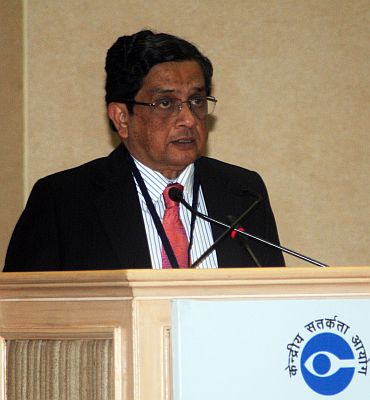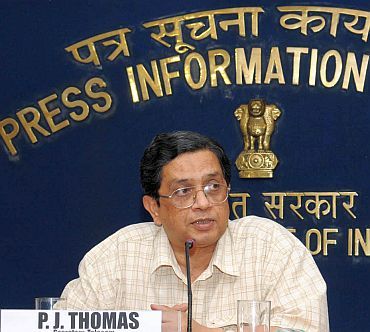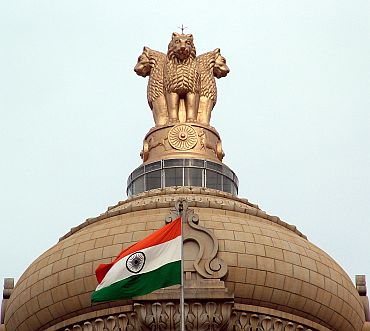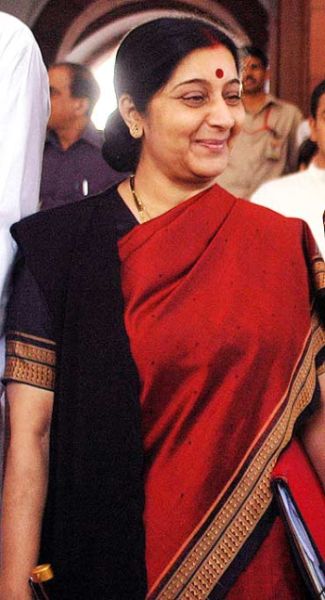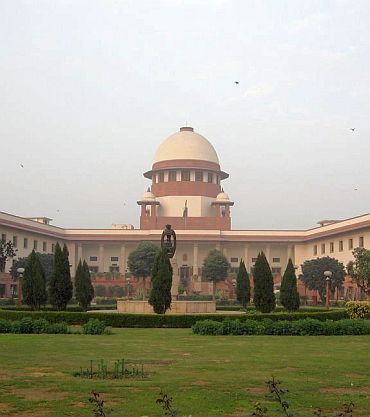 | « Back to article | Print this article |
Sonia, PM and the UPA govt have hit a new low
Sheela Bhatt analyses the Supreme Court's landmark verdict on Thursday, quashing the appointment of PJ Thomas as Central Vigilance Commissioner.
A million thanks to Chief Vigilance Commissioner PJ Thomas for not resigning before the trend-setting Supreme Court judgment by Justice S H Kapadia, Justice Panicker Radhakrishnan and Justice Swatanter Kumar.
The thinking of judges, as reflected in the ruling, resonates well with the country's current mood to have "accountability' in decisions of governance that matters. If Thomas had resigned before the filing of the case questioning the legality of his appointment, the country would not have got a wonderfully judicious order from the Supreme Court.
Thomas's exit would have ended the matter out of court. But now, for all the future governments, guidelines have been added in the appointment of the CVC. The judgment has gone quite far in improving the entire system of appointing the CVC.
The apex court ordered that Thomas's "impugned appointment" should be "quashed" because it has "no existence in the eye of the law." Although Thomas has been disgraced, the case against him has proved beneficial in straightening the codes of governance on the issue.
Click on NEXT to read further...
Sonia will be and should be compelled to take note of the judgment
The Apex court judgment is mum on CVC Thomas's personal integrity and gravity of the charges against him. In fact, the judgment "indicts" more the system of this government than any individual. In that sense, the judgment is more "solution-oriented " than punishing the wrongdoers.
Law Minister Veerappa Moily meekly accepted that, "in future we would refer to this judgment."
Even, Congress chief Sonia Gandhi will be and should be compelled to take note of the judgment as she, invariably, has her hand behind many controversial appointments to high posts in the United Progressive Alliance government.
The verdict has humbled the arrogance of the people in power
The story began on September 3, 2010 when a High-Powered Committee comprising Prime Minister Manmohan Singh, Home Minister P Chidambaram and Leader of Opposition Sushma Swaraj met, as per the requirement of law, to appoint the Chief Vigilance Commissioner.
Sushma disagreed with Dr Singh and Chidambaram, but the government preferred to go ahead, as per majority of two, and appointed Thomas. Sushma's objection dealt with Thomas's involvement in an old criminal case regarding the import of Pamolein oil.
The petitioners, including the Centre for Public Interest Litigation, challenged Thomas's appointment in the Supreme Court.
The effect of the judgment is so electrifying that it has humbled the arrogance of the people in power.
Sonia and PM will eventually blame the 'system' and carry on
The judgment is a direct blow to Dr Singh and lawyer minister Chidambaram because being the part of three-member HPC they were directly responsible for "illegal" appointment of Thomas.
Hopefully, Thursday's ruling will serve as the speed-breaker for all high-level appointments. Any other weak government of weak leaders would have been shaken up to its core with such judgment. But, Sonia and Dr Singh will eventually blame the "system" and carry on.
It should be noted that the judgment is harping more on action or omission of action of Department of Personnel and Training for not putting up the correct facts before the HPC. Its little dissatisfying to note that babus of DoPT are blamed for not preparing files properly, but the court has not commented if it was done deliberately or not. In effect, it is not blasting Dr Singh, directly.
The institutional integrity has been affected
But, these are merely technicalities because Sushma had informed both of them in the September 2010 meeting about the CVC's pending case and the past issues. She had decided against filing her version through an affidavit in the same case. So it seems that the court has not taken into account her version.
Also, the judgment says, "In the present case apart from the pending criminal proceedings (against Thomas), as stated above, between the period 2000 and 2004 various notings of DoPT recommended disciplinary proceedings against P J Thomas in respect of Palmolein case. Those notings have not been considered by the HPC."
Thomas, obviously, didn't resign till Thursday because he wanted to shift the blame entirely on the government for his appointment and wanted the latter to do the fielding. The court has not said anything directly against Thomas's integrity. It merely said that the institutional integrity had been affected.
The ruling has opened up the selection process of the CVC
To the relief of Thomas, the court said in the very beginning that the judgment was not about merit of Thomas nor was it about government policy. It mentions, "Government is not accountable to the courts in respect of policy decisions. However, they are accountable for the legality of such decisions. While deciding this case, we must keep in mind the difference between legality and merit as also between judicial review and merit review."
Interestingly, Sushma also got the message from the Apex court.
In future, the member of HPC will have to give reasons in writing while dissenting. Also, the judgment says that no member, out of the three, will have veto power and that the decision of appointing the CVC could be majority judgment and no unanimity is necessary.
The ruling said, 'There is no prescription of unanimity or consensus under Section 4(2) of the 2003 Act. However, the question still remains as to what should be done in cases of difference of opinion amongst the members of the HPC. As in the present case, if one member of the committee (Sushma) dissents that member should give reasons for the dissent and if the majority disagrees with the dissent, the majority shall give reasons for overruling the dissent.'
The ruling has opened up the selection process of the CVC by stating that in future the zone of consideration should not be restricted to civil servants. And all civil servants and other persons empanelled shall be outstanding civil servants or persons of impeccable integrity.
A day of shame for the UPA government
Thursday was a day of shame for the UPA government in Supreme Court. In another case related to black money and accused Hasan Ali Khan, the government was taken to task.
The government was severely criticized by Judge SS Nijjar and the case is likely to get intensified in future. Judge Nijjar read the report filed by agency, which also had interrogation of Hasan Ali who has been slapped tax notice of Rs 50000 crore for allegedly stashing $8 billion in foreign banks.
The judge rebuked, "Is this the interrogation or the friendly chat between Hasan Ali and interrogators?"
Immediately, the petitioner's lawyer said this is the case of "collusion" between the accused and investigators.
Ashok Deshbhratar, a police officer from Maharashtra, also figured in the courtroom. He openly alleged that the government was denying him promotion for interrogating Hasan Ali in 2008. He has moved to the tribunal for justice.
The court has not taken this issue lightly.
When Solicitor General Gopal Subramanium tried to explain some issues, the bench retorted back, saying, "What the hell is going on in this country?"
In more than six years of power, ethical deficit of Sonia Gandhi and Dr Singh's government touched a new low today.
